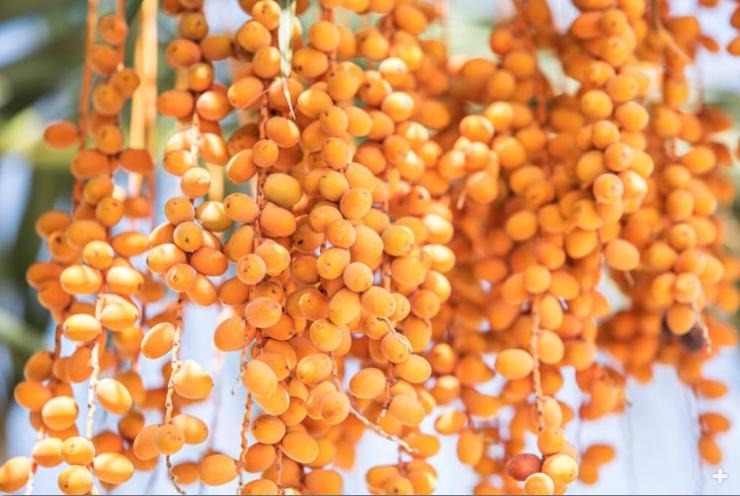Dates (Phoenix dactylifera) Farmers Community
Can Dates Be Used as Fertilizer?: a comprehensive guide
- This topic is empty.
- AuthorPosts
- February 12, 2025 at 11:17 am #562185
 Agric4ProfitsKeymaster
Agric4ProfitsKeymaster
Dates, often referred to as the “fruit of life,” are cherished for their nutritional value and widespread use in various cuisines.
Beyond their culinary benefits, dates also offer potential uses in agricultural practices, particularly in the realm of organic farming. One such potential use is as a natural fertilizer.
This article explores the question: Can dates be used as fertilizer? We will delve into how dates might contribute to soil health, the benefits they offer in agricultural practices, and the potential for their use as an eco-friendly alternative to synthetic fertilizers.
1. Nutrient Content of Dates for Agricultural Use
Dates are rich in a variety of nutrients, which could potentially benefit soil health if used as fertilizer. They contain a significant amount of potassium, calcium, magnesium, and phosphorus, which are essential for plant growth.
These nutrients are key to promoting root development, improving flower and fruit production, and enhancing overall plant health.
The high sugar content in dates also provides an energy source for beneficial soil microbes, encouraging microbial activity that can improve soil structure and fertility. Thus, the nutrient profile of dates makes them a promising option for organic fertilization.
2. Dates as a Source of Organic Matter
One of the most important benefits of using dates as fertilizer is their ability to contribute organic matter to the soil.
Organic matter is crucial for maintaining soil structure, improving water retention, and providing a stable environment for plant roots. When dates decompose, they add humus to the soil, enriching it with valuable organic compounds.
This not only enhances soil fertility but also supports the growth of healthy plants by improving the balance of soil organisms.
As organic farming practices continue to rise in popularity, the use of date by-products as a natural fertilizer aligns well with sustainable agriculture practices.
3. Potential for Dates as a Sustainable Fertilizer Option
With growing concerns about the environmental impact of synthetic fertilizers, many farmers are seeking alternative, eco-friendly options for enhancing soil health. Dates, particularly those that are discarded or overripe, offer a sustainable solution.
By recycling waste dates, which are often left to rot in date production areas, farmers can reduce food waste while simultaneously benefiting their crops.
This circular approach supports sustainability by minimizing landfill waste and reducing the need for synthetic chemical fertilizers, which can have harmful long-term effects on the environment.
Using dates as fertilizer thus provides a practical and eco-friendly solution for farmers seeking to minimize their carbon footprint.
4. Application Methods for Dates in Fertilization
While the idea of using dates as fertilizer may seem unconventional, various methods can be employed to incorporate them into agricultural practices.
Dates can be crushed or ground into a fine paste or powder, making them easier to distribute as a fertilizer. The use of date palms’ fronds or other parts of the tree also contributes to organic matter in the soil.
Additionally, dates can be mixed into compost piles, where they will break down and add valuable nutrients to the finished compost. When applied properly, date-based fertilizers can provide a slow-release nutrient source for plants, which can be beneficial for long-term soil health.
5. Limitations and Considerations for Using Dates as Fertilizer
Despite the potential benefits, there are a few limitations and considerations to keep in mind when using dates as fertilizer. The sugar content in dates could attract pests like ants or rodents if not managed carefully.
Additionally, dates alone may not provide all the nutrients needed for optimal plant growth, especially in nutrient-deficient soils. As such, it is important to use dates as part of a balanced fertilization strategy, combining them with other organic or inorganic fertilizers if necessary.
Furthermore, the availability of dates as a fertilizer may vary depending on the region, making it a more feasible option in areas with a surplus of date production or waste.
Dates can indeed be used as fertilizer, offering numerous benefits for soil health and plant growth. Rich in essential nutrients and organic matter, dates have the potential to improve soil fertility and support sustainable farming practices.
Their use as a natural fertilizer aligns well with the growing trend toward eco-friendly, organic farming solutions, providing a sustainable alternative to synthetic fertilizers.
While there are some limitations to consider, such as pest attraction and nutrient balance, dates can be an effective and environmentally conscious addition to the agricultural sector. In conclusion, dates are not only a nutritious food source but also an eco-friendly fertilizer option that can contribute to healthier soils and more sustainable farming practices.
Read Also: Is Dates Good For Weight Gain
- AuthorPosts
- You must be logged in to reply to this topic.

